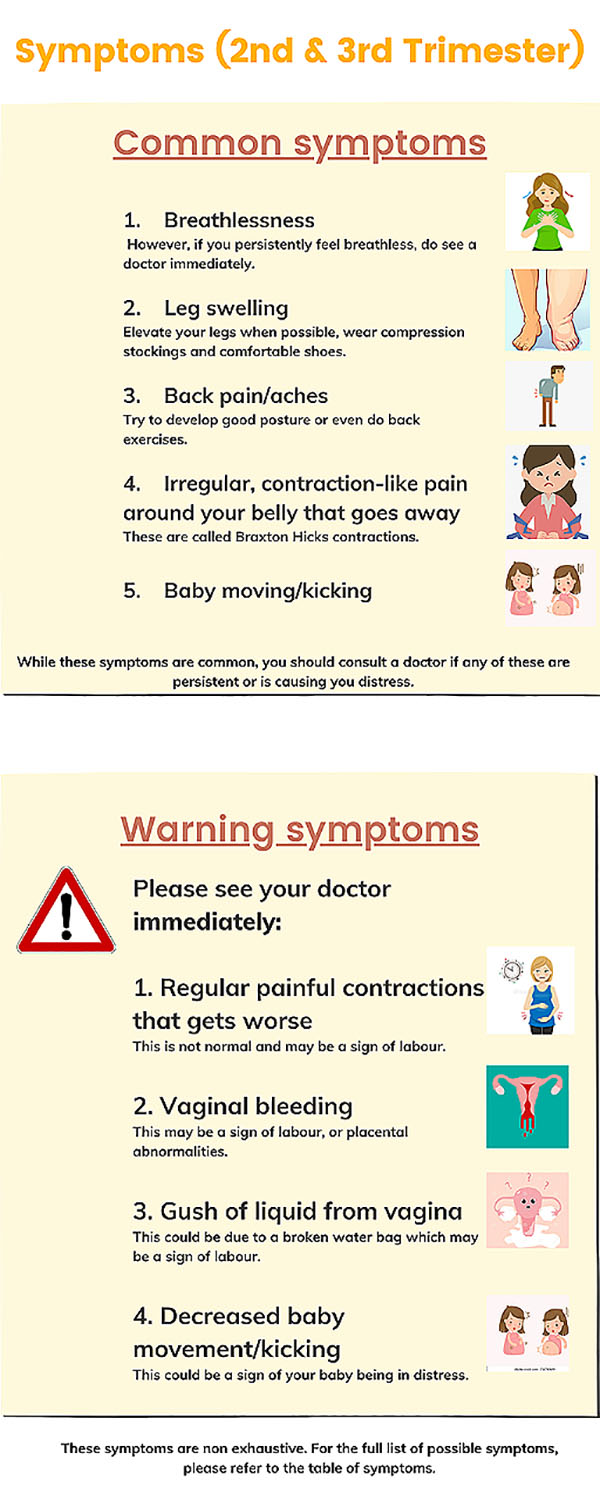
Trimester Pregnancy Symptoms: A Comprehensive Guide
Pregnancy is a transformative journey marked by a myriad of physical, emotional, and hormonal changes. These changes are often categorized into three distinct trimesters, each characterized by its own unique set of symptoms. Understanding these symptoms can help expectant mothers navigate the complexities of pregnancy with greater awareness and preparedness.
First Trimester (Weeks 1-12)
- Missed Period: The most common early sign of pregnancy is a missed menstrual period. However, some women may experience irregular periods or spotting, so it’s not always a definitive indicator.
- Nausea and Vomiting (Morning Sickness): Up to 80% of pregnant women experience nausea and vomiting, typically starting around week 6. It’s often worse in the morning but can occur at any time of day.
- Fatigue: Extreme fatigue is a hallmark of the first trimester, as the body works hard to support the growing fetus.
- Breast Tenderness and Enlargement: Hormonal changes can cause breasts to become tender, swollen, and darker in color.
- Frequent Urination: As the uterus expands, it puts pressure on the bladder, leading to more frequent urination.
- Mood Swings: Fluctuating hormone levels can trigger mood swings, irritability, and emotional sensitivity.
- Food Cravings and Aversions: Altered taste and smell can lead to intense cravings for certain foods and aversions to others.
- Skin Changes: Increased blood flow can cause the skin to appear flushed or develop a "pregnancy glow."
- Constipation: Hormonal changes and the growing uterus can slow down digestion, leading to constipation.
Second Trimester (Weeks 13-27)
- Fetal Movement: Around week 16-20, most women begin to feel the baby’s movements, known as "quickening."
- Reduced Nausea and Vomiting: Morning sickness typically subsides by the end of the first trimester.
- Increased Energy: As hormone levels stabilize, energy levels often improve.
- Growing Belly: The uterus continues to expand, making the belly more prominent.
- Weight Gain: Weight gain is expected during pregnancy, with most women gaining 1-2 pounds per week in the second trimester.
- Leg Cramps: Increased weight and pressure on the nerves can cause leg cramps.
- Heartburn and Indigestion: The growing uterus can push the stomach upward, leading to heartburn and indigestion.
- Varicose Veins: Increased blood volume and pressure can cause varicose veins to develop.
- Hemorrhoids: Constipation and pressure on the veins in the rectum can cause hemorrhoids.
Third Trimester (Weeks 28-40)
- Increased Fetal Activity: The baby’s movements become more frequent and stronger.
- Shortness of Breath: The growing uterus pushes up against the diaphragm, making it harder to breathe.
- Swelling (Edema): Fluid retention can cause swelling in the hands, feet, and ankles.
- Back Pain: The weight of the baby and the changing posture can put strain on the back.
- Insomnia: Discomfort, anxiety, and frequent urination can disrupt sleep.
- Frequent Braxton Hicks Contractions: Irregular contractions that prepare the body for labor.
- Pelvic Pressure: The baby’s head descends into the pelvis, putting pressure on the pelvic floor.
- Colostrum Leakage: The breasts may start producing colostrum, a nutrient-rich fluid that precedes breast milk.
- Nesting Instinct: A strong urge to prepare the home and surroundings for the baby’s arrival.
When to Seek Medical Attention
While most pregnancy symptoms are normal, it’s important to seek medical attention if you experience any of the following:
- Severe nausea and vomiting that prevents you from eating or drinking
- Vaginal bleeding or spotting
- Abdominal pain or cramping
- Fever or chills
- Sudden or severe headache
- Vision changes
- Swelling in the face, hands, or feet that doesn’t go away
- Difficulty breathing
Managing Trimester Symptoms
- First Trimester:
- Get plenty of rest and avoid overexertion.
- Eat small, frequent meals to reduce nausea.
- Stay hydrated by drinking plenty of fluids.
- Exercise regularly, as tolerated.
- Consider using over-the-counter medications for nausea, such as ginger or vitamin B6.
- Second Trimester:
- Maintain a healthy diet and exercise routine.
- Elevate your legs to reduce swelling.
- Use pillows to support your back and belly while sleeping.
- Practice relaxation techniques, such as yoga or meditation.
- Third Trimester:
- Rest as much as possible and avoid heavy lifting.
- Wear comfortable shoes and support hose to prevent swelling.
- Sleep on your side with pillows between your legs.
- Take prenatal classes to prepare for labor and delivery.
- Monitor your baby’s movements and report any changes to your healthcare provider.
Conclusion
Pregnancy symptoms are a normal part of the journey, but understanding and managing them can help expectant mothers feel more comfortable and prepared. By being aware of the common symptoms of each trimester and seeking medical attention when necessary, women can navigate this transformative time with greater confidence and well-being. Remember that every pregnancy is unique, and it’s important to consult with your healthcare provider for personalized guidance and support throughout the process.